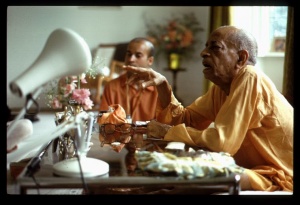SB 4.13.47

A.C. Bhaktivedanta Swami Prabhupada
TEXT 47
- evaṁ sa nirviṇṇa-manā nṛpo gṛhān
- niśītha utthāya mahodayodayāt
- alabdha-nidro 'nupalakṣito nṛbhir
- hitvā gato vena-suvaṁ prasuptām
SYNONYMS
evam — thus; saḥ — he; nirviṇṇa-manāḥ — being indifferent in mind; nṛpaḥ — King Aṅga; gṛhāt — from home; niśīthe — in the dead of night; utthāya — getting up; mahā-udaya-udayāt — opulent by the blessings of great souls; alabdha-nidraḥ — being without sleep; anupalakṣitaḥ — without being seen; nṛbhiḥ — by people in general; hitvā — giving up; gataḥ — went off; vena-suvam — the mother of Vena; prasuptām — sleeping deeply.
TRANSLATION
Thinking like that, King Aṅga could not sleep at night. He became completely indifferent to household life. Once, therefore, in the dead of night, he got up from bed and left Vena's mother [his wife], who was sleeping deeply. He gave up all attraction for his greatly opulent kingdom, and, unseen by anyone, he very silently gave up his home and opulence and proceeded towards the forest.
PURPORT
In this verse the word mahodayodayāt indicates that by the blessings of a great soul one becomes materially opulent, but when one gives up attachment to material wealth, that should be considered an even greater blessing from the great souls. It was not a very easy task for the King to give up his opulent kingdom and young, faithful wife, but it was certainly a great blessing of the Supreme Personality of Godhead that he could give up the attachment and go out to the forest without being seen by anyone. There are many instances of great souls' leaving home in this way in the dead of night, giving up attachment for home, wife and money.